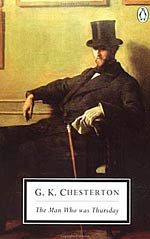
![]() Scott Laz
Scott Laz
2/6/2012
![]()
The Man Who Was Thursday: A Nightmare (the subtitle should not be neglected), G. K. Chestertons’ 1908 novel, is the only (so far, anyway) spy thriller/comic fantasy/Christian allegory I’ve come across. I’d long been curious about it, having been vaguely aware of Chesterton’s reputation as a writer, and seen it crop up on the Guardian’s list of best SF/fantasy, as well as being listed in James Cawthorn and Michael Moorcock’s Fantasy: The Best 100 Books.
To me, the allegorical aspect was off-putting, making the final chapter a disappointment, but the first fourteen chapters are hugely entertaining, and the novel as a whole is a fascinating example of a literary dreamscape. The underlying theme of society’s battle to maintain order in a world where the individual may be tempted by the romance of chaos (as represented by the anarchist), while not entirely convincing, is worthy of consideration. Chesterton’s heroes are those who are willing to make the individual sacrifices needed to maintain order, even in the face of indifference of hostility from those around them.
Poet Gabriel Syme is recruited as a detective, and charged with the undercover mission of infiltrating the anarchist elements of London, which he does by gaining access to this underground through fellow poet Gregory, whom he goads into proving that his anarchic poetic stance is not just a pose by taking him to meet the cell of bomb-throwing terrorists to which he belongs. The details by which this occurs are completely implausible (even to Syme), but it quickly becomes clear that the logic of the real world does not apply to this story, and that the dreamlike progression of the story will take him where he needs to go. After giving a rousing campaign speech, Syme is elected to represent the cell in the anarchists’ central council, where each member’s code name is a day of the week, and Syme becomes known as Thursday.
Chesterton does a wonderful job of reproducing the feeling of being in a dream—the way one accepts strange events as they are happening, only realizing after it’s over how odd or amusing they seem. This feeling is heightened by the dilation and expansion of time in the story. For example, here’s a description of a trip from London to Dover: “Having got his information, he bundled the company into a cab, and put them and himself inside a railway carriage before they had properly realized the breathless process. They were already on the Calais boat before conversation flowed freely.” What matters at this point in the story/dream is getting the characters from London to France; the trip itself can be ignored, so the train ride to the coast takes no time at all. Other sequences combine the whimsical with the nightmarish. Syme is chased around London by a crippled old man who couldn’t possibly keep up with him, yet he manages to pop up everywhere Syme stops. This chase occurs in the midst of a snowstorm, even though the rest of the story seems to be set in the summer. The anarchist leader Sunday leads Syme and his allies on a chase through London, staying ahead of them by employing a taxicab, an elephant, and ultimately a balloon for transport. These events are portrayed straightforwardly, and Syme has long since accepted that things like this will happen to him since he became involved in attempting to stop the anarchists. We don’t question a dream while we are dreaming…
Much of the enjoyment of The Man Who Was Thursday comes through repeated revelations that things are not what they seem, so further summary risks “spoiling” the story for those who haven’t read it. (Can you spoil a novel published over a century ago?) The twists keep coming until the very end, and the novel maintains a wonderful momentum throughout. Individual inclinations will determine whether readers sympathize with the ending, but even after that final reveal, the argument of the poets that begins the novel still reverberates, whether you accepts Chesterton’s ultimate conclusion or not. Is it revolt or law that is the basis of poetry? According to the poet Gregory, “An artist disregards all governments, abolishes all conventions. The poet delights in disorder only. If it were not so, the most poetical thing in the world would be the Underground Railway.” According to the poet Syme: “The rare, strange thing is to hit the mark; the gross, obvious thing is to miss it. We feel it is epical when man with one wild arrow strikes a distant bird. Is it not also epical when man with one wild engine strikes a distant station? Chaos is dull; because in chaos the train might indeed go anywhere, to Baker Street, or to Bagdad. But man is a magician, and his whole magic is in this, that he does say Victoria, and lo! it is Victoria. No, take your books of mere poetry and prose, let me read a time-table, with tears of pride.” Chesterton comes down on the side of order, but not before indulging in a lot of entertaining chaos. Not to advocate bomb-throwing, but I’m willing to leave the question open…